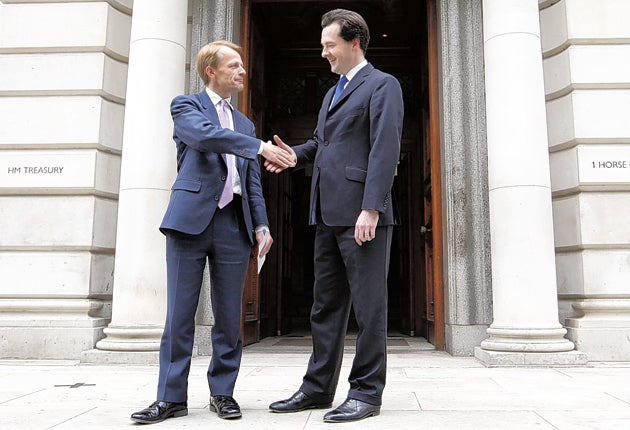A two-party government: the questions raised

Your support helps us to tell the story
From reproductive rights to climate change to Big Tech, The Independent is on the ground when the story is developing. Whether it's investigating the financials of Elon Musk's pro-Trump PAC or producing our latest documentary, 'The A Word', which shines a light on the American women fighting for reproductive rights, we know how important it is to parse out the facts from the messaging.
At such a critical moment in US history, we need reporters on the ground. Your donation allows us to keep sending journalists to speak to both sides of the story.
The Independent is trusted by Americans across the entire political spectrum. And unlike many other quality news outlets, we choose not to lock Americans out of our reporting and analysis with paywalls. We believe quality journalism should be available to everyone, paid for by those who can afford it.
Your support makes all the difference.Q. What is Nick Clegg's role?
A. From a desk in the Cabinet Office, he has been given the job of pushing through an agreed programme of political reform. He will put a binding motion before the House of Commons stating that the next general election will be held on the first Thursday of May 2015. A Referendum Bill will reform the size of constituencies and cut the number of MPs. He will also hand voters the power to recall their MP and draw up proposals for a wholly or partly elected House of Lords.
Q. Will there be collective responsibility?
A. David Cameron has been at pains to point out this will be a full coalition government. That means collective responsibility for those given jobs within it. The Liberal Democrats will be represented in all departments, meaning they can keep a close eye on the decisions being taken. While it will make them confident that they are not being misled, it also increases the chances of a resignation if a minister really cannot stomach the policy being adopted.
Q. Will there be a joint whips' office?
A. Both parties will still have their own whips' offices. But worryingly for free-thinking Lib Dems, there will only be one chief whip – Patrick McLoughlin, a Tory. He will have authority over all government ministers. The good news for the Lib Dems in the Government is he is not one to throw tea cups around.
Q. Will the parties have to agree on everything?
A. No. They have already marked out areas in which Lib Dem MPs will have permission to abstain when votes are cast in the House of Commons. One example is a Tory commitment to give married couples a tax break. Mr Clegg described the plans as "patronising drivel that belong in the Edwardian age". Other profound areas of disagreement include nuclear power and university tuition fees.
Q .Will the parties fight each other in by-elections?
A. The prospect of the Thirsk and Malton by-election later this month immediately threw up the question of whether or not the new coalition partners would campaign against each other. Yesterday, Mr Cameron made clear that both parties will run candidates, saying they would campaign "in that intensely reasonable way that we often do". Mr Clegg admitted that the coalition partners would have to get used to the odd arrangement.
Q. What will happen at Prime Minster's Questions when Mr Cameron is away?
A. Harriet Harman, the deputy Labour leader, always took Gordon Brown's place when the former prime minister was not present. Back then, William Hague, the Foreign Secretary, always filled in for Mr Cameron. But under the new arrangement, it will be Mr Clegg defending the Government at the dispatch box.
Q. What will happen to the two questions Mr Clegg used to ask at PMQs?
A. Labour is expected to argue they should be handed the two Lib Dem questions, giving the new Leader of the Opposition eight questions instead of the current six. However, the minority parties will argue they should be given the questions. The Speaker's Office is drawing up a compromise that would see Labour take seven questions and the minority parties have one on a rotational basis.
Q. Will there be any other changes to PMQs?
A. With a fresh drive for political reform, there are already moves behind the scenes to make some major changes to PMQs. First off, there is a chance it could be moved from its current slot on Wednesday afternoon. Before the election, the Tories showed some interest in moving it to Thursday to give the political week more of a crescendo. The Speaker, John Bercow, is sympathetic to the idea. He is also interested in doubling the length of PMQs, allowing more backbenchers to take part. Mr Clegg has been in favour of the move in the past, but he would have to persuade the Prime Minister.
Q. Can Mr Cameron sack Liberal Democrats from the Cabinet?
A. The agreement states that only Mr Clegg can sack the Lib Dem members of the Government. The same goes for Mr Cameron and his MPs in the coalition. However, this will be very difficult in practice, should pressure grow to remove a minister. Ultimately, Mr Cameron is the Prime Minister.
Join our commenting forum
Join thought-provoking conversations, follow other Independent readers and see their replies
Comments